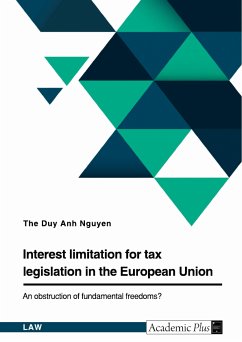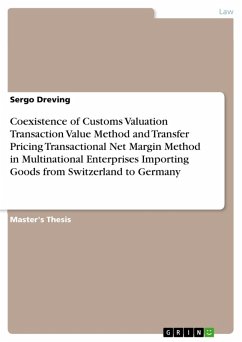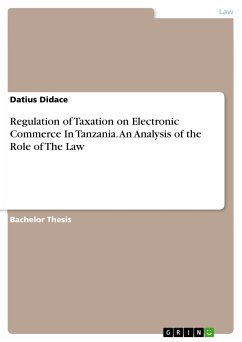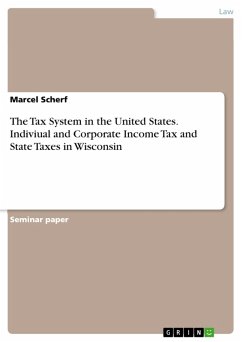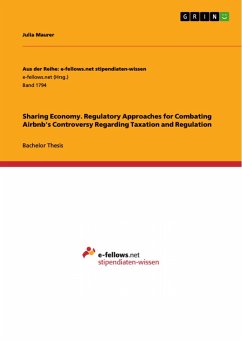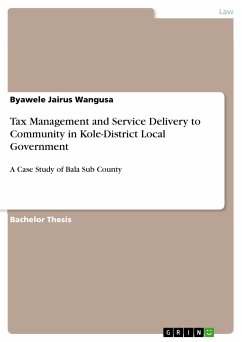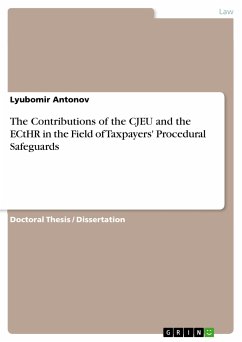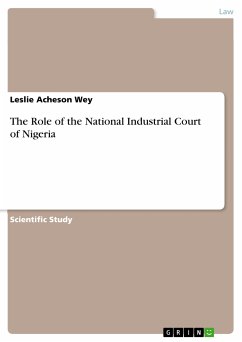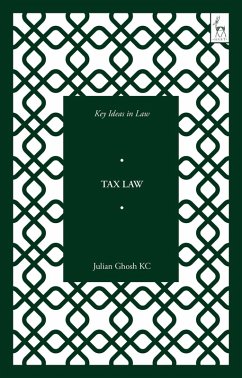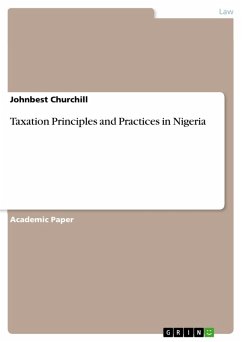
Taxation Principles and Practices in Nigeria (eBook, PDF)
Versandkostenfrei!
Sofort per Download lieferbar
Statt: 52,95 €**
39,99 €
inkl. MwSt. und vom Verlag festgesetzt.
**Preis der gedruckten Ausgabe (Broschiertes Buch)
Alle Infos zum eBook verschenkenWeitere Ausgaben:

PAYBACK Punkte
0 °P sammeln!
Academic Paper from the year 2022 in the subject Law - Tax / Fiscal Law, grade: 4.5, National Open University of Nigeria, language: English, abstract: Taxation is perhaps the oldest recognized profession in the world. It has always been with us, it is still with us, and it will continue to be with us. According to chapter two, verse one of St. Luke's gospel of the Holy Bible which reported the birth of our Lord Jesus Christ with a decree from Augustus Ceasar that all the world should be taxed. "and it came to pass in those days that there went a decree from Ceasar Augustus that all the world s...
Academic Paper from the year 2022 in the subject Law - Tax / Fiscal Law, grade: 4.5, National Open University of Nigeria, language: English, abstract: Taxation is perhaps the oldest recognized profession in the world. It has always been with us, it is still with us, and it will continue to be with us. According to chapter two, verse one of St. Luke's gospel of the Holy Bible which reported the birth of our Lord Jesus Christ with a decree from Augustus Ceasar that all the world should be taxed. "and it came to pass in those days that there went a decree from Ceasar Augustus that all the world should be taxed;" (and this taxing was first made when Cyrenious was governor of Asyria). This Biblical record is perhaps the origin of taxation. Taxation may be defined as the compulsory contribution imposed by a public authority, irrespective of the amount of services rendered to the taxpayer in return. Taxation can also be defined according to Ola (1987) as the demand made by the Government of a country for compulsory payment of money by the citizens of the country. Tabansi (1997) says tax is a levy imposed by the Government against the income, profit or wealth of the individual, partnership and corporate organization. The above definitions emphasizes the fact that taxation is a compulsory levy or contribution that is imposed by the Government on the people resident in the country. Since it is a compulsory payment made either directly or indirectly, refusal to comply becomes an offence, which attracts punishment. Taxation is divided into various types such as Income Tax, Corporation Tax, Capital Gain Tax etc. In Nigeria, tax is levied by the authority of Federal Government Income Tax Management Act of 1961 (ITMA) and subsequent amendment, including the finance (Miscellaneous Taxation Provisions) Decree 1992 and the finance (Miscellaneous Provisions) Decree 1997. The tax year of most government establishment is based on the fiscal year, which is the normal calendar year and ranges from 1st January to 31st December of the same year. This income tax year is also called the year of assessment, for instance the 1999 year of assessment is the 1999 fiscal year.
Dieser Download kann aus rechtlichen Gründen nur mit Rechnungsadresse in A, B, BG, CY, CZ, D, DK, EW, E, FIN, F, GR, HR, H, IRL, I, LT, L, LR, M, NL, PL, P, R, S, SLO, SK ausgeliefert werden.




